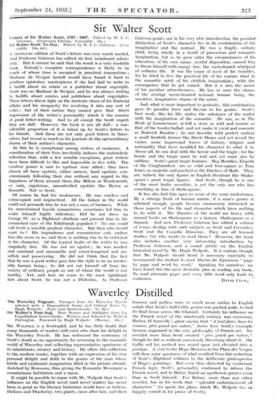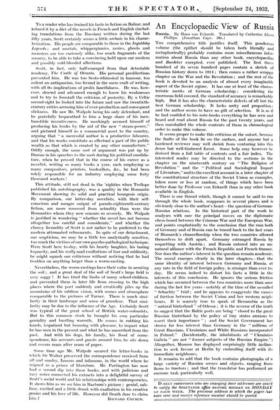Waverley Distilled
The Waverley Pageant. Passages from the Waverley Novels selected with a Biographical Essay and Critical Notes by Hugh Walpole. (Eyre and Spottiswoode. 8s. 6d.) Sir Walter's Post-bag. More Stories and Sidelights from his Unpublished Letter-books. Written and Selected by Wilfred. Partington. Foreword by Hugh Walpole. (Murray. 16s.) Ma. WALPOLE is a Seottophil, and he has little doubt that many thousands of readers still exist who share his delight in the Waverley Novels. He has welcomed- the centenary of
Scott's death as an opportunity for returning to the romantic world of Waverley and collecting representative specimens of its inhabitants, scenery and history. He offers this collection to the modern reader, together with an expression of his own personal delight and faith in the genius of the man whose fertile and exuberant imagination filled in the picture already sketched by Rousseau, thus giving the Romantic Movement a mountainous habitation and a name.
It might be possible to argue with Mr. Walpole that Scott's influence on the English novel (and novel reader) has never been so great as the literary historians would have us believe. Dickens and Thaekeray, two giants, came after him, and their humour and pathos were so much more native to English minds that Scott's half-Celtic genius was pushed aside, to find its final home across the Channel. Certainly his influence on the French novel of the nineteenth century was enormous. Barbey D'Aurevilly's great saying that " it faut faire, dans les romans, plus grand que nature," shows how Scott's example became engrained in the very philosophy of French art. No novelist more than Scott created "plus grand que nature," though he did so without consciously theorizing about it. On Gallic soil his • method was seized upon and elevated into a pratiquc. A visit to the Hugo Museum in the Place des Vosges will show sonic specimens of what resulted from this reduction of Scott's Highland wildness to the deliberate grotesquerics of Hugo's paintings. But even thus distorted by exuberant French logic, Scott's personality continued to inform the French novel, and in Balzac found an apotheosis greater even than in Scott himself. For Balzac, more than any other novelist, has in his work that " splendid embarrassment of characters" (to quote the phase which Mr. Walpole has so happily coined in his praise of Scott).
To a reader.who has trained his taste in fiction-on Babac, and refined it by a diet of the novels in French and English (includ- ing translations. from the Russian) written during the last fifty years, Scott certainly seems a little archaic in his charac- terization. His people are comparable to those in the Ingoldsby Legends ; and mortals, whipperginnies, zanies, ghosts and monsters are too curiously alike, too much fragments of the scenery, to be able to take a convincing hold upon our modern and possibly cold-blooded affections.
Scott, in fact, only half-emerged from that detestable academy, The Castle of Otranto. His personal predilections prevented him. He was too Scots-whimsical in humour, too ardent an antiquarian, too fecund in the mere craft of writing, with all its implications of prolix fancifulness. He was, how- ever, shrewd and advanced enough to know his weaknesses and to try to forestall the criticism of posterity. By a Celtic second-sight he looked into the future and saw the twentieth- -century critics accusing him of over-production and consequent slickness. He saw Mr. Walpole being his only defendant, and he gratefully bequeathed to him a large share of his inex- haustible inventiveness. He mockingly accused himself of producing his books by the aid of the new " steam-power," and pictured himself as a commercial asset to the country, arguing that " a successful author is a productive labourer, and that his works constitute as effectual a part of the public wealth as that which is created by any other manufacture." Oddly enough, the same sort of argument was put up by Dumas in his speeches to the mob during his political candida- ture, when he proved that in the course of his career as a novelist, writing so many books a year, each employing so many compositors, printers, booksellers, &c., he had been solely responsible for an industry employing sonic forty thousand workers !
This attitude, still not dead in the 'eighties when Trollope published his autobiography, was a quality in the Romantic Movement showing its solid and practical bourgeois origin. By comparison, our latter-day novelists, with their self- conscious and meagre output of pseudo-eighteenth-century fiction, are more removed from actuality than were the Romantics whom they now censure so severely. Mr. Walpole is justified in wondering " whether the novel has not become altogether too careful and considerate," and whether the clumsy fecundity of Scott is not rather to be preferred to the modern attenuated refinements. In spite of our detachment, . our scepticism, we may be a little too analytically sensitive, too much the victims of our own psycho-pathological technique. Were Scott here to-day, with his hearty laughter, his boring loquacity, and his really mad exultations of fear and sublimity, he might squash our criticisms without noticing that he had trodden on anything larger than a worm-casting.
Nevertheless, the worm-castings have their value in aerating the soil ; and a great deal of the soil of Scott's large field is very soggy ! It has tired the limbs of many school-children, and prevented them in later life from crossing to the high places where the poet suddenly and erratically piles up the mountains of his sublime vision, with scenes and atmosphere comparable to the pictures of Turner. There is much simi- larity in their landscape and sense of grandeur. That simi- larity may be due to the influence of the Age. Certainly Scott ♦ vas typical of the great school of British water-colourists. But to this common stock he brought his own particular geniality and bustling warmth. He comes in rubbing his hands, impatient but beaming with pleasure, to impart what he has seen in the present and what he has unearthed from the past. And with his dogs, his family, his flood of corre- spondence, his servants and guests around him, he sits down and covers ream after ream of paper.
Some time ago Mr. Walpole secured the letter-books in which Sir Walter preserved the correspondence received from all and sundry, famous and infamous, in the world where he reigned as a prince of literature. Mr. Partington has now had a second dip into these books, and with judicious and racy notes connected his extracts into a delightful survey of Scott's social world and his relationships with contemporaries. It shows him as we see him in Raeburn's picture ; genial, sub- lime, excited and a little drunk with exultation in his creative genius-and his love of life. However did Death dare to claim































 Previous page
Previous page